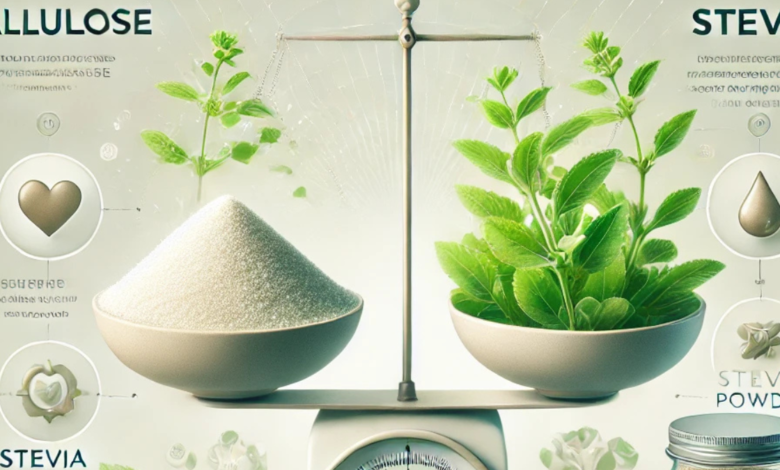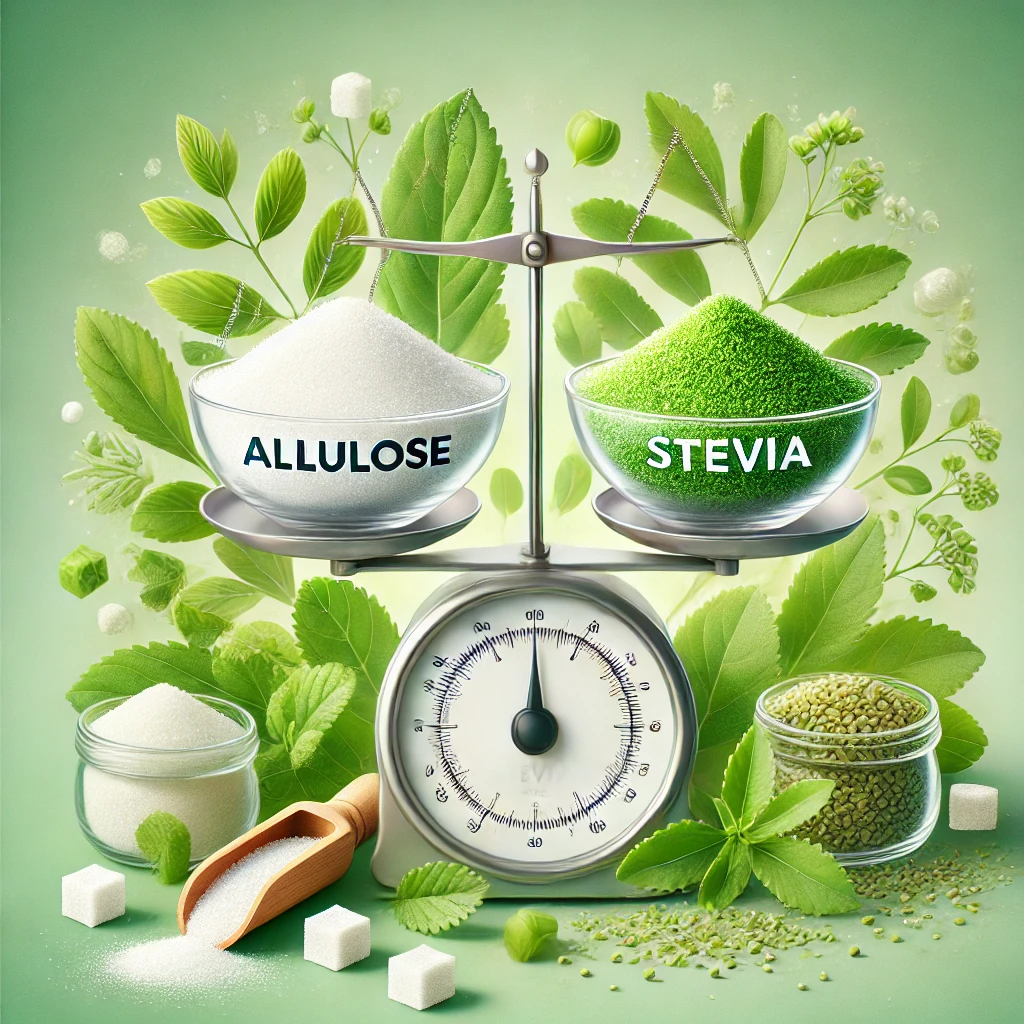Sweetness Showdown: Allulose vs. Stevia – Which One Wins Your Taste and Health

Introduction to Natural Sweeteners
In recent years, the hunt for healthier Allulose vs. Stevia has skyrocketed. With growing concerns about obesity, diabetes, and other sugar-related Allulose vs. Stevia issues, more consumers are turning to natural sweeteners to satisfy their cravings without guilt. Among the most popular choices are allulose and stevia, two unique sweeteners that promise sweetness without the calories or blood sugar spikes associated with traditional Allulose vs. Stevia. But how do they compare in taste, health benefits, and everyday usability? This article delves deep into the showdown between allulose and stevia to help you make an informed choice.
What is Allulose?
Allulose vs. Stevia naturally found in small quantities in foods like figs, raisins, and wheat. Unlike regular sugar, its chemical structure allows it to be absorbed by the body without being metabolized, making it virtually calorie-free. Despite its low caloric value, allulose closely mimics the taste and texture of sugar, providing a satisfying sweetness without the typical drawbacks of sugar consumption.
In the kitchen, allulose shines as a versatile sweetener. It dissolves quickly and retains its sweetness when heated, making it ideal for baking and cooking. Beyond its culinary uses, allulose boasts several health benefits. Studies show that it minimises blood sugar and insulin levels, making it a diabetic-friendly option. Additionally, allulose may promote gut health by feeding beneficial gut bacteria, which can improve digestion and overall wellness.
However, Allulose vs. Stevia is not without its downsides. When consuming large amounts, some individuals may experience digestive discomfort, such as bloating or gas. Furthermore, allulose is relatively new to the market, so it may not be as widely available or affordable as other sweeteners. Despite these challenges, its impressive taste and health profile make allulose a promising sugar substitute for many.
What is Stevia?
Allulose vs. Stevia, derived from the leaves of the Stevia rebaudiana plant, has been used for centuries as a natural sweetener. Its active compounds, steviol glycosides, are responsible for its intense sweetness, up to 300 times sweeter than sugar. Unlike Allulose vs. Stevia, stevia contains zero calories, making it a popular choice for those looking to reduce their caloric intake.
One of Allulose vs. Stevia standout features is its unique taste profile. While it delivers a robust sweetness, some users find it leaves a slightly bitter or liquorice-like aftertaste. This has led manufacturers to blend stevia with other sweeteners to enhance its flavour and usability. Stevia is available in various forms, including liquid drops, powder, and granulated blends, making it a versatile option for sweetening beverages, desserts, and more.
Allulose vs. Stevia offers several health benefits. It does not raise blood sugar levels, making it suitable for people with diabetes. Emerging research suggests that stevia may have antioxidant properties, which could help combat oxidative stress and inflammation. Despite these advantages, scientists and health professionals debate stevia’s long-term safety and overuse.
While Allulose vs. Stevia popularity grows, it’s essential to acknowledge its limitations. Its intense sweetness can be overwhelming, and its aftertaste may not appeal to everyone. Additionally, as a highly processed product, not all stevia-based sweeteners are purely natural, so consumers should carefully read labels to avoid unwanted additives.
Allulose vs. Stevia – Head-to-Head Comparison

Sweetness Level and Taste
When it comes to sweetness, both allulose and stevia excel, but they offer distinct experiences. Allulose’s flavour resembles sugar, with a clean, mild sweetness and no aftertaste. In contrast, stevia delivers an intense sweetness but often leaves a bitter or licorice-like aftertaste, which can be polarizing. For those who prioritize taste, allulose may have the edge.
Impact on Health
Both allulose and stevia are excellent options for blood sugar management. Allulose’s unique absorption process means it has little to no impact on blood glucose or insulin levels. Similarly, stevia is wholly calorie-free and does not affect blood sugar, making it ideal for people with diabetes. Beyond diabetes, allulose’s potential gut health benefits and stevia’s possible antioxidant properties make both sweeteners valuable for overall health.
Culinary Applications
In terms of usability, allulose is the more versatile sweetener. Its sugar-like texture and stability under heat make it an excellent choice for baking and cooking. While suitable for beverages and some desserts, Stevia can’t always replicate sugar’s role in recipes due to its intense sweetness and lack of bulk. For bakers and chefs, allulose is often the preferred option.
Cost and Availability
Stevia has been on the market longer and is widely available at a lower cost, making it more accessible to consumers. As a newer entrant, Allulose is less commonly found and typically more expensive. However, as production scales and demand grows, allulose may become more affordable.
Side Effects and Tolerances
While generally safe, both sweeteners have potential side effects. Allulose can cause digestive discomfort, such as bloating or diarrhoea, when consumed in large quantities. On the other hand, Stevia may cause allergic reactions in some individuals and is sometimes criticized for its highly processed nature. Moderation is key when using either sweetener to minimize side effects.
Which Sweetener is Right for You?
Choosing between allulose and stevia ultimately depends on your preferences and health goals. If you prioritize taste and versatility, allulose is the clear winner. Its sugar-like flavour and excellent performance in cooking and baking make it a standout choice for those seeking a seamless sugar substitute. However, if you’re looking for a zero-calorie sweetener that’s widely available and cost-effective, stevia is a strong contender.
When selecting a sweetener, consider your dietary needs, taste preferences, and intended use. Both options are suitable for diabetics or those on a ketogenic diet, but experimenting with small quantities of each can help determine which one best suits your palate and lifestyle.
Conclusion
Both allulose and stevia offer unique benefits as natural sugar alternatives. Allulose excels in taste and versatility, while stevia provides zero calories and widespread availability. The choice between the two comes down to individual needs and preferences. As natural sweeteners gain popularity, both options demonstrate that enjoying sweetness doesn’t have to come at the cost of your health.
FAQs
- What are the main differences between allulose and stevia?
- Allulose tastes like sugar and works well in baking, while stevia is sweeter, calorie-free, and may leave an aftertaste.
- Can allulose and stevia be used together?
- Yes, blending them can balance sweetness and reduce aftertaste.
- Is allulose or stevia better for people with diabetes?
- Both are diabetic-friendly, as they don’t spike blood sugar levels.
- Which sweetener is more suitable for baking?
- Allulose is better for baking due to its sugar-like properties.
- Are there any long-term side effects of consuming allulose or stevia?
- Both are generally safe in moderation, but overconsumption may lead to digestive discomfort or other minor issues.
You May Also Read: https://ventsbuz.com/hip-dips/





